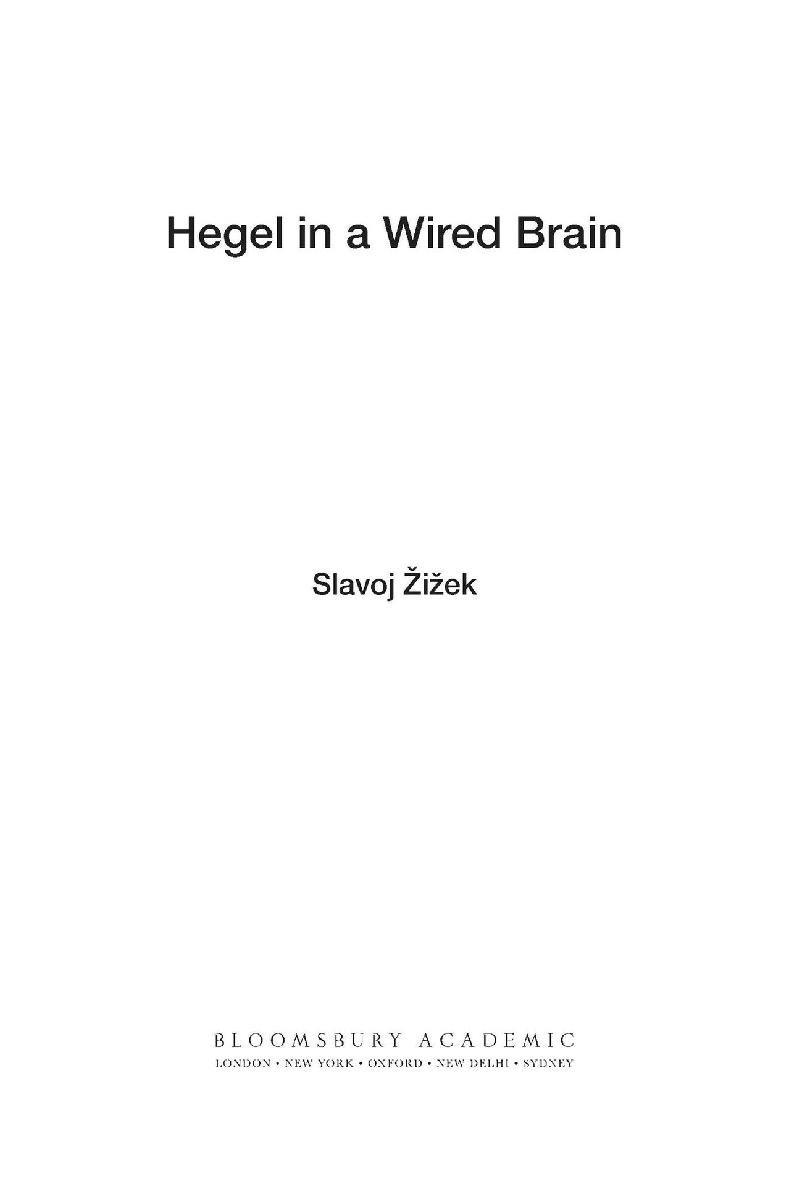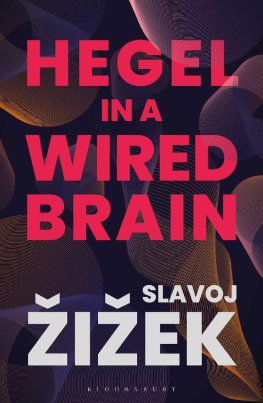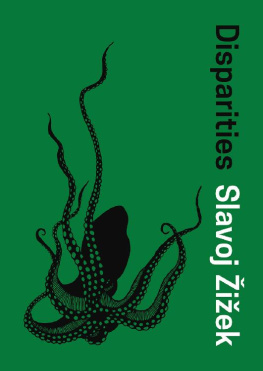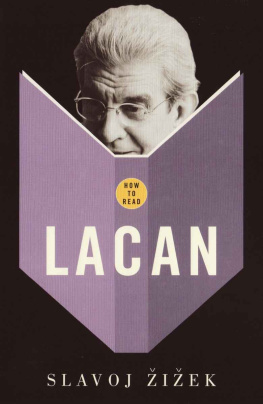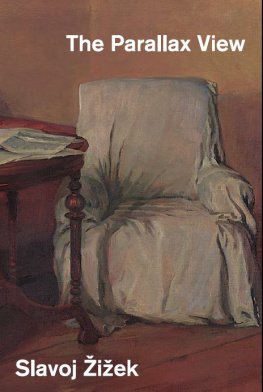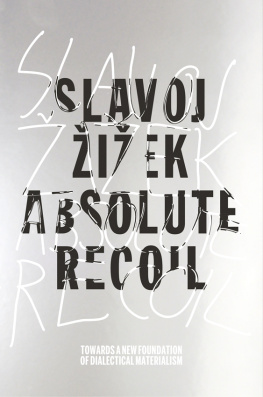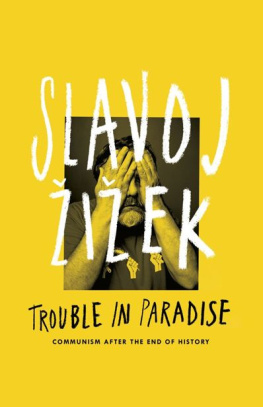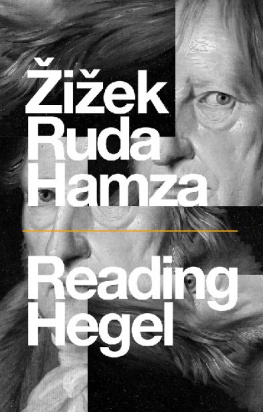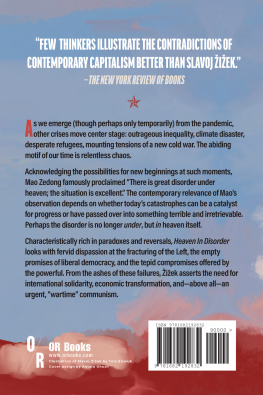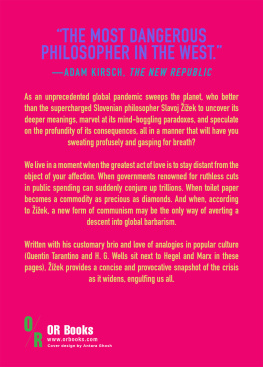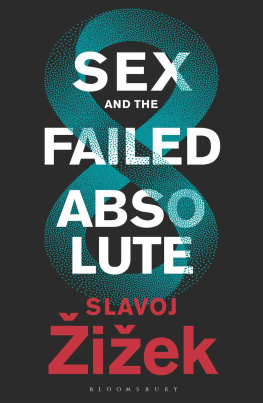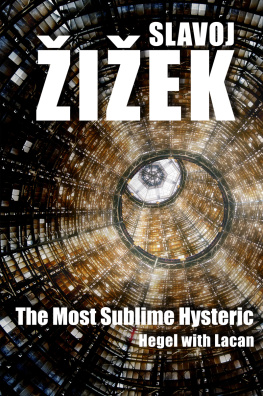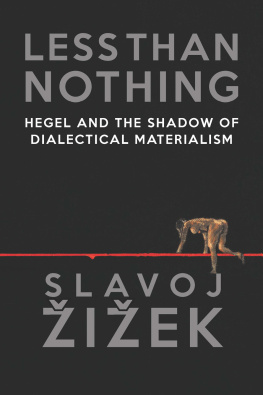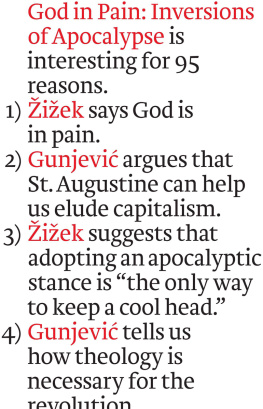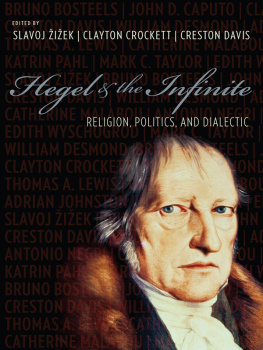Hegel in a Wired Brain
For Jela, with love.
Nothing more, but this is enough.
Also Available from Bloomsbury
Sex and the Failed Absolute, Slavoj iek
Disparities, Slavoj iek
Antigone, Slavoj iek
Contents
In 2020, we are celebrating the 250th anniversary of the birth of Hegel. Is Hegel just a historical curiosity or does his thought still address us? Un jour peut-tre, le sicle sera Deleuzien, Michel Foucault wrote decades ago in a review of one of Gilles Deleuzes books. The hypothesis of the present book is that, if, in some sense, the twentieth century was not Deleuzian, but Marxian, the twenty-first century will be Hegelian. This claim cannot but appear as a display of madness is, in our universe of quantum physics and evolutionary biology, of cognitive sciences and digitalization, of global capitalism and totalitarianism, Hegel not simply out? Our first point is not that Hegel somehow saw all this or had a premonition of it no, he didnt, and he knew that he could not. The Hegelian Absolute Knowing does not imply that Hegel knew it all, it stands precisely for the realization of an unsurpassable limit. Recall Hegels emphatic dismissal of issuing instructions on how the world ought to be from the Preface of his Philosophy of Right :
philosophy, at any rate, always comes too late to perform this function. As the thought of the world, it appears only at a time when actuality has gone through its formative process and attained its completed state When philosophy paints its grey in grey, a shape of life has grown old, and it cannot be rejuvenated, but only recognized, by the grey in grey of philosophy; the owl of Minerva begins its flight only with the onset of dusk.
Robert Pippin noted the obvious (although rarely drawn) implication of this claim: it has to apply also to the notion of State deployed in his own Philosophy of Right the fact that Hegel was able to deploy its concept means that dusk is falling on what readers of Hegel usually perceive as a normative description of a model rational state. Thats why Hegels thought stands for a radical opening towards the future: there is in Hegel no eschatology, no image of the bright (or dark) future towards which our epoch tends. It may appear no less obvious that, for this same reason, Hegel is the worst possible choice for a thinker through whose lens one should read our present yes, he was totally open towards the future, but was he not for this very reason unable to cast any light on it?
Our wager is here the exact opposite of this obvious platitude: precisely as totally out of date, Hegels thought provides unique lenses to perceive the prospects and threats of our time. To be a Hegelian today does not mean to construct a new ideal (of full recognition, of rational state, of scientific knowing), and then analyze how and why we are not yet there and how to get there. What it means is to act as a true post-Hegelian: to take Hegel not as a conclusion but as a starting point and ask: how would our present state of things appear from this starting point? Again, what if Hegel allows us as a better (proper) understanding of precisely those phenomena which are distinctly post-Hegelian, which stand for what Hegel couldnt imagine?
But which Hegel am I referring to here? Where am I speaking from? To simplify it to the utmost, the triad that defines my philosophical stance is that of Spinoza, Kant and Hegel. Spinoza is arguably the pinnacle of realist ontology: there is substantial reality out there, and we can get to know it through our reason, dispelling the veil of illusions. Kants transcendental turn introduces a radical gap here: we cannot ever gain access to the way things are in themselves, our reason is constricted to the domain of phenomena, and if we try to reach beyond phenomena to the totality of being, our mind gets caught in necessary antinomies and inconsistencies. What Hegel does here is to posit that there is no reality in-itself beyond phenomena, which does not mean that all that there is is the interplay of phenomena. The phenomenal world is marked by the bar of impossibility, but beyond this bar there is nothing, no other world, no positive reality, so we are not returning to pre-Kantian realism; it is just that what for Kant is the limitation of our knowledge, the impossibility to reach the thing-in-itself, is inscribed into this thing itself.
But, again, can Hegel still play this role of the unsurpassable horizon of our thinking? Does the true rupture with traditional metaphysical universe, the rupture which defines the coordinates of our thinking, not take place later? The safest indication of this rupture is our gut feeling that overwhelms us when we read some classical metaphysical text something tells us that today, we simply cannot any longer think like that And does such a gut feeling also not overwhelm us when we read Hegels speculations about the absolute Idea, etc.? There are a couple of candidates for this rupture which makes Hegel no longer our contemporary, beginning with the post-Hegelian turn of Schelling, Kierkegaard and Marx, but this turn can be easily accounted for in the terms of an immanent reversal of the German Idealist topic. With regard to philosophical issues that predominated in the last decades, a new and more convincing case for this rupture was made by Paul Livingston who, in his The Politics of Logic , located it in the new space symbolized by the names Cantor and Goedel, where, of course, Cantor stands for set theory, through self-relating procedures (empty set, set of sets), and compels us to admit an infinity of infinities, and Goedel for his two incompleteness theorems which demonstrate that to simplify it to the utmost an axiomatic system cannot demonstrate its own consistency since it necessarily generates statements which can neither be proved nor disproved by it.
With this rupture, we enter a new universe which compels us to leave behind the notion of a consistent view of (all of) reality. (Even Marxism, at least in its predominant form, can still be viewed as a mode of thinking that belongs in the old universe: it elaborates a quite consistent view of social totality, in some versions even of the all of reality.) However, the new universe has nothing whatsoever to do with the irrationalism of Lebensphilosphie whose first representative was Schopenhauer, i.e., with the idea that our rational mind is just a thin surface and that the true bases of reality are irrational drives. We remain within the domain of reason, and this domain is deprived of its consistency from within: immanent inconsistencies of reason do not imply that there is some deeper reality which escapes reason; these inconsistencies are in some sense the thing itself. We thus find ourselves in a universe in which inconsistencies are not a sign of our epistemological confusion, of the fact that we missed the thing itself (which by definition cannot be inconsistent), but, on the contrary, a sign that we have touched the real.
The roots of all these inconsistencies are, of course, the paradoxes of self-relating, of a set becoming one of its own elements, of a set including an empty set as one of its sub-sets, as its own stand-in among its sub-sets. The Hegelo-Lacanian perspective conceives these paradoxes as an indication of the presence of subjectivity: subject can emerge only in the imbalance between a genus and its species, the void of subjectivity is ultimately the empty set as the species in which a genus encounters itself in its oppositional determination, as Hegel would have put it. But how can the same feature be the sign of subjectivity and simultaneously the sign that we touched the real? Do we not touch the real precisely when we succeed in erasing our subjective standpoint and perceive things the way they really are, independently of our subjective standpoint? The lesson of both Hegel and Lacan is exactly the opposite: every vision of objective reality is already constituted through (transcendental) subjectivity, and we only touch the real when we include in the scope of our vision the cut-in-the-real of subjectivity itself.
